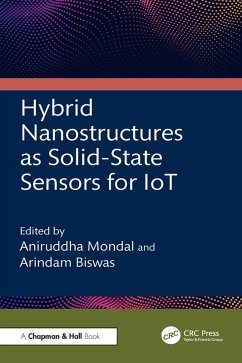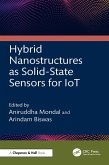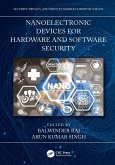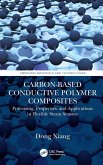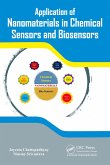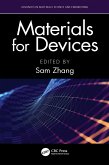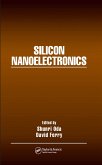Hybrid Nanostructures as Solid-State Sensors for IoT (eBook, ePUB)
Redaktion: Mondal, Aniruddha; Biswas, Arindam
54,95 €
54,95 €
inkl. MwSt.
Sofort per Download lieferbar

27 °P sammeln
54,95 €
Als Download kaufen

54,95 €
inkl. MwSt.
Sofort per Download lieferbar

27 °P sammeln
Jetzt verschenken
Alle Infos zum eBook verschenken
54,95 €
inkl. MwSt.
Sofort per Download lieferbar
Alle Infos zum eBook verschenken

27 °P sammeln
Hybrid Nanostructures as Solid-State Sensors for IoT (eBook, ePUB)
Redaktion: Mondal, Aniruddha; Biswas, Arindam
- Format: ePub
- Merkliste
- Auf die Merkliste
- Bewerten Bewerten
- Teilen
- Produkt teilen
- Produkterinnerung
- Produkterinnerung

Bitte loggen Sie sich zunächst in Ihr Kundenkonto ein oder registrieren Sie sich bei
bücher.de, um das eBook-Abo tolino select nutzen zu können.
Hier können Sie sich einloggen
Hier können Sie sich einloggen
Sie sind bereits eingeloggt. Klicken Sie auf 2. tolino select Abo, um fortzufahren.

Bitte loggen Sie sich zunächst in Ihr Kundenkonto ein oder registrieren Sie sich bei bücher.de, um das eBook-Abo tolino select nutzen zu können.
The book provides an in-depth discussion of various Hybrid Nanostructures as solid-state sensors in the context of the Internet of Things (IoT). It explains the vital role that sensors play in IoT to aid in discovering what possibilities ought to be addressed to make the data more meaningful.
- Geräte: eReader
- mit Kopierschutz
- eBook Hilfe
Andere Kunden interessierten sich auch für
![Hybrid Nanostructures as Solid-State Sensors for IoT (eBook, PDF) Hybrid Nanostructures as Solid-State Sensors for IoT (eBook, PDF)]() Hybrid Nanostructures as Solid-State Sensors for IoT (eBook, PDF)54,95 €
Hybrid Nanostructures as Solid-State Sensors for IoT (eBook, PDF)54,95 €![Nanoelectronic Devices for Hardware and Software Security (eBook, ePUB) Nanoelectronic Devices for Hardware and Software Security (eBook, ePUB)]() Nanoelectronic Devices for Hardware and Software Security (eBook, ePUB)45,95 €
Nanoelectronic Devices for Hardware and Software Security (eBook, ePUB)45,95 €![Carbon-Based Conductive Polymer Composites (eBook, ePUB) Carbon-Based Conductive Polymer Composites (eBook, ePUB)]() Dong XiangCarbon-Based Conductive Polymer Composites (eBook, ePUB)50,95 €
Dong XiangCarbon-Based Conductive Polymer Composites (eBook, ePUB)50,95 €![Application of Nanomaterials in Chemical Sensors and Biosensors (eBook, ePUB) Application of Nanomaterials in Chemical Sensors and Biosensors (eBook, ePUB)]() Jayeeta ChattopadhyayApplication of Nanomaterials in Chemical Sensors and Biosensors (eBook, ePUB)69,95 €
Jayeeta ChattopadhyayApplication of Nanomaterials in Chemical Sensors and Biosensors (eBook, ePUB)69,95 €![Materials for Devices (eBook, ePUB) Materials for Devices (eBook, ePUB)]() Materials for Devices (eBook, ePUB)58,95 €
Materials for Devices (eBook, ePUB)58,95 €![Nanosensors (eBook, ePUB) Nanosensors (eBook, ePUB)]() Nanosensors (eBook, ePUB)67,95 €
Nanosensors (eBook, ePUB)67,95 €![Silicon Nanoelectronics (eBook, ePUB) Silicon Nanoelectronics (eBook, ePUB)]() Silicon Nanoelectronics (eBook, ePUB)68,95 €
Silicon Nanoelectronics (eBook, ePUB)68,95 €-
-
-
The book provides an in-depth discussion of various Hybrid Nanostructures as solid-state sensors in the context of the Internet of Things (IoT). It explains the vital role that sensors play in IoT to aid in discovering what possibilities ought to be addressed to make the data more meaningful.
Hinweis: Dieser Artikel kann nur an eine deutsche Lieferadresse ausgeliefert werden.
Dieser Download kann aus rechtlichen Gründen nur mit Rechnungsadresse in A, B, BG, CY, CZ, D, DK, EW, E, FIN, F, GR, HR, H, IRL, I, LT, L, LR, M, NL, PL, P, R, S, SLO, SK ausgeliefert werden.
Hinweis: Dieser Artikel kann nur an eine deutsche Lieferadresse ausgeliefert werden.
Produktdetails
- Produktdetails
- Verlag: Taylor & Francis eBooks
- Erscheinungstermin: 27. Dezember 2024
- Englisch
- ISBN-13: 9781040262542
- Artikelnr.: 72271611
- Verlag: Taylor & Francis eBooks
- Erscheinungstermin: 27. Dezember 2024
- Englisch
- ISBN-13: 9781040262542
- Artikelnr.: 72271611
- Herstellerkennzeichnung Die Herstellerinformationen sind derzeit nicht verfügbar.
Aniruddha Mondal has been an Associate Professor in the Department of Physics at the National Institute of Technology Durgapur since 2014. He earned his PhD in Electronic Science from Calcutta University in 2008. He then served as Institute Postdoctoral Fellow in the Department of Electrical Engineering at the Indian Institute of Technology Kanpur (2008¿ 2009). Then, he was appointed as Research Professor/ Assistant Professor at Dongguk University in Seoul, Republic of Korea (2009¿ 2010), where he worked at the Millimeter Wave Innovation Technology Research Centre. He also worked as Assistant Professor at the National Institute of Technology Agartala, Tripura, in the Department of Electronics and Communication Engineering for 4.5 years (2010¿ 2014). His research interests include the fabrication of III- V, IIIN, perovskite, and thermochromic thin films and nanostructure semiconductor materials, 1D metal oxide semiconductor nanostructure using glancing angle deposition technique, and fabrication of UV-Vis detector, infrared detector, plasmonic detector, and hybrid semiconductor detectors. He has published more than 88 papers in highly reputed Science Citation Index (SCI) journals, 58 conference papers, and holds 3 patents. He has guided 13 PhD students, and 3 PhD students are currently working under his supervision along with one Postdoctoral Fellow/ RA. He has completed seven projects as PI, funded by the Department of Science and Technology (Science and Engineering Research Board, India) [DST (SERB)], Board of Research in Nuclear Sciences (Department of Atomic Energy, India) [BRNS (DAE)], All- India Council for Technical Education (AICTE), and Indian Space Research Organization (ISRO). Currently, two projects funded by DST (SERB) and ISRO are running under his supervision. Arindam Biswas is presently an Associate Professor in the School of Mines and Metallurgy at Kazi Nazrul University, West Bengal, India. He also serves as adjunct faculty at Taylor's University, Malaysia. He earned an MTech degree in Radio Physics and Electronics from the University of Calcutta, India, in 2010 and completed his PhD at NIT Durgapur in 2013. He has worked as a postdoctoral researcher at Pusan National University, South Korea, with the prestigious BK21PLUS Fellowship, Republic of Korea. Biswas has received the DST- JSPS Invitation Fellowship at RIE, Japan, and the DST- ASEAN Invitation Fellowship at Duy Tan University, Vietnam, and Taylor's University, Malaysia. He has also served as Visiting Fellow in the Department of Electrical and Computer Engineering at the National University of Singapore. He has worked as Specially Appointed Associate Professor (Visiting) at the Research Institute of Electronics, Shizuoka University, Japan. He has been selected for IE (I) Young Engineer Award for 2019¿ 20, KNU Best Researcher Award (Engineering and Technology) for 2021, and KNU Best Faculty Award for 2022 (Faculty of Science). He has authored 8 books/ monographs and edited 24 volumes and 10 book chapters with international repute. Biswas has received research grants from various funding agencies, including SERB, DST- ASEAN, DST- JSPS, UGC, and industrial consultancy from Eastern Coalfield Limited (ECL). He has also received an international research grant from the Centre of Biomedical Engineering, Tokyo Medical and Dental University, in association with RIE, Shizuoka University, Japan, for four consecutive years from 2019 to 2023. Biswas has guided six PhD students, with an additional three students having submitted their theses for PhD. He is a lifetime member of the Institute of Engineers (India), the Mining, Geological & Metallurgical Institute of India (MGMI), Regular Fellow of Optical Society of India, and a member of the Institute of Electrical and Electronics Engineers (IEEE).
1: Introduction 2 : Preparation of metal Oxide Semiconductor Nanostructure
and their structural properties 3 : Polymer Semiconductors and FET sensors
4 : Fabrication Of Gas Sensor Using Metal Oxide Semiconductor
Nanostructures 5 : Study Of Biosensors Based On Metal Oxide Semiconductor
Nanostructures 6 : Biosensor Overview And Its Advances For Cancer Detection
7: Recent Progress in Nanomaterials-based IoT-Enabled Sensor
and their structural properties 3 : Polymer Semiconductors and FET sensors
4 : Fabrication Of Gas Sensor Using Metal Oxide Semiconductor
Nanostructures 5 : Study Of Biosensors Based On Metal Oxide Semiconductor
Nanostructures 6 : Biosensor Overview And Its Advances For Cancer Detection
7: Recent Progress in Nanomaterials-based IoT-Enabled Sensor
1: Introduction 2 : Preparation of metal Oxide Semiconductor Nanostructure
and their structural properties 3 : Polymer Semiconductors and FET sensors
4 : Fabrication Of Gas Sensor Using Metal Oxide Semiconductor
Nanostructures 5 : Study Of Biosensors Based On Metal Oxide Semiconductor
Nanostructures 6 : Biosensor Overview And Its Advances For Cancer Detection
7: Recent Progress in Nanomaterials-based IoT-Enabled Sensor
and their structural properties 3 : Polymer Semiconductors and FET sensors
4 : Fabrication Of Gas Sensor Using Metal Oxide Semiconductor
Nanostructures 5 : Study Of Biosensors Based On Metal Oxide Semiconductor
Nanostructures 6 : Biosensor Overview And Its Advances For Cancer Detection
7: Recent Progress in Nanomaterials-based IoT-Enabled Sensor
